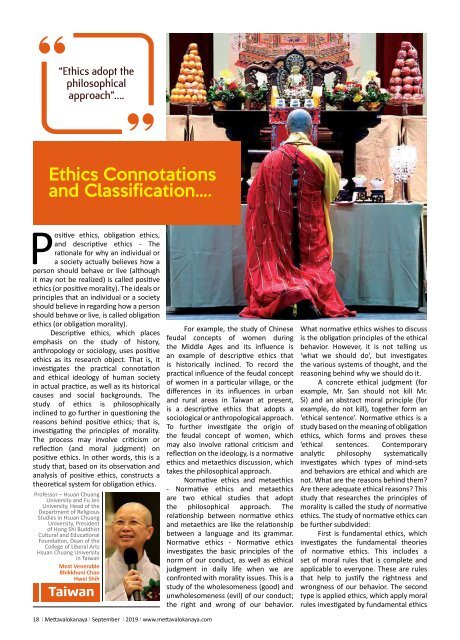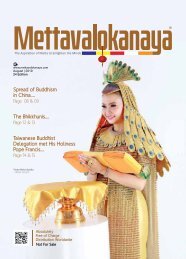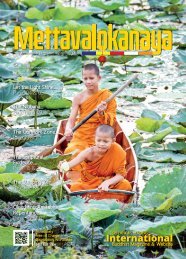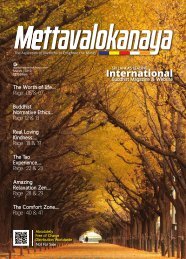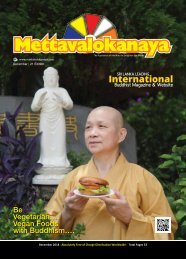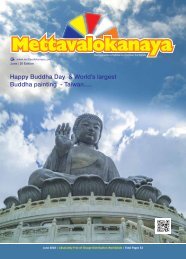Mettavalokanaya_International_Buddhist_Magazine_September_2019
This is the Sri Lankan's Most Popular & Leading Monthly International Buddhist Magazine, “Mettavalokanaya” on September 2019 Edition - 25. Now you can download & read our “Mettavalokanaya” all Magazines via online. “Mettavalokanaya” Buddhist Magazine has been successfully distributed to 40 countries including all districts across Sri Lanka and distribute to all Overseas Chief Sangha Nayaka Theros, Worldwide Buddhist Associations, High Commissions & Embassies situated in Sri Lanka & overseas Sri Lankan High Commissions & Embassies.
This is the Sri Lankan's Most Popular & Leading Monthly International Buddhist Magazine, “Mettavalokanaya” on September 2019 Edition - 25.
Now you can download & read our “Mettavalokanaya” all Magazines via online.
“Mettavalokanaya” Buddhist Magazine has been successfully distributed to 40 countries including all districts across Sri Lanka and distribute to all Overseas Chief Sangha Nayaka Theros, Worldwide Buddhist Associations, High Commissions & Embassies situated in Sri Lanka & overseas Sri Lankan High Commissions & Embassies.
Create successful ePaper yourself
Turn your PDF publications into a flip-book with our unique Google optimized e-Paper software.
“Ethics adopt the<br />
philosophical<br />
approach”….<br />
Ethics Connotations<br />
and Classification….<br />
Positive ethics, obligation ethics,<br />
and descriptive ethics - The<br />
rationale for why an individual or<br />
a society actually believes how a<br />
person should behave or live (although<br />
it may not be realized) is called positive<br />
ethics (or positive morality). The ideals or<br />
principles that an individual or a society<br />
should believe in regarding how a person<br />
should behave or live, is called obligation<br />
ethics (or obligation morality).<br />
Descriptive ethics, which places<br />
emphasis on the study of history,<br />
anthropology or sociology, uses positive<br />
ethics as its research object. That is, it<br />
investigates the practical connotation<br />
and ethical ideology of human society<br />
in actual practice, as well as its historical<br />
causes and social backgrounds. The<br />
study of ethics is philosophically<br />
inclined to go further in questioning the<br />
reasons behind positive ethics; that is,<br />
investigating the principles of morality.<br />
The process may involve criticism or<br />
reflection (and moral judgment) on<br />
positive ethics. In other words, this is a<br />
study that, based on its observation and<br />
analysis of positive ethics, constructs a<br />
theoretical system for obligation ethics.<br />
Professor – Hsuan Chuang<br />
University and Fu Jen<br />
University, Head of the<br />
Department of Religious<br />
Studies in Hsuan Chuang<br />
University, President<br />
of Hong Shi <strong>Buddhist</strong><br />
Cultural and Educational<br />
Foundation, Dean of the<br />
College of Liberal Arts<br />
Hsuan Chuang University<br />
in Taiwan<br />
Most Venerable<br />
Bhikkhuni Chao<br />
Hwei Shih<br />
Taiwan<br />
For example, the study of Chinese<br />
feudal concepts of women during<br />
the Middle Ages and its influence is<br />
an example of descriptive ethics that<br />
is historically inclined. To record the<br />
practical influence of the feudal concept<br />
of women in a particular village, or the<br />
differences in its influences in urban<br />
and rural areas in Taiwan at present,<br />
is a descriptive ethics that adopts a<br />
sociological or anthropological approach.<br />
To further investigate the origin of<br />
the feudal concept of women, which<br />
may also involve rational criticism and<br />
reflection on the ideology, is a normative<br />
ethics and metaethics discussion, which<br />
takes the philosophical approach.<br />
Normative ethics and metaethics<br />
- Normative ethics and metaethics<br />
are two ethical studies that adopt<br />
the philosophical approach. The<br />
relationship between normative ethics<br />
and metaethics are like the relationship<br />
between a language and its grammar.<br />
Normative ethics - Normative ethics<br />
investigates the basic principles of the<br />
norm of our conduct, as well as ethical<br />
judgment in daily life when we are<br />
confronted with morality issues. This is a<br />
study of the wholesomeness (good) and<br />
unwholesomeness (evil) of our conduct;<br />
the right and wrong of our behavior.<br />
What normative ethics wishes to discuss<br />
is the obligation principles of the ethical<br />
behavior. However, it is not telling us<br />
‘what we should do’, but investigates<br />
the various systems of thought, and the<br />
reasoning behind why we should do it.<br />
A concrete ethical judgment (for<br />
example, Mr. San should not kill Mr.<br />
Si) and an abstract moral principle (for<br />
example, do not kill), together form an<br />
‘ethical sentence’. Normative ethics is a<br />
study based on the meaning of obligation<br />
ethics, which forms and proves these<br />
‘ethical sentences. Contemporary<br />
analytic philosophy systematically<br />
investigates which types of mind-sets<br />
and behaviors are ethical and which are<br />
not. What are the reasons behind them?<br />
Are there adequate ethical reasons? This<br />
study that researches the principles of<br />
morality is called the study of normative<br />
ethics. The study of normative ethics can<br />
be further subdivided:<br />
First is fundamental ethics, which<br />
investigates the fundamental theories<br />
of normative ethics. This includes a<br />
set of moral rules that is complete and<br />
applicable to everyone. These are rules<br />
that help to justify the rightness and<br />
wrongness of our behavior. The second<br />
type is applied ethics, which apply moral<br />
rules investigated by fundamental ethics<br />
to various practical areas in life. They<br />
help to clarify and solve specific moral<br />
issues confronted in practical life.<br />
Metaethics - This ethical study<br />
takes ethical justification and morality<br />
rules as its research objects. It is a study<br />
that analyzes the meanings and special<br />
characteristics of ethical phrases or<br />
words (for example, wholesome) and<br />
the ethical sentences formed by ethical<br />
phrases (for example, helping others is a<br />
wholesome act). This is called the study<br />
of metaethics.<br />
What metaethics is concerned<br />
with is not the structure or proof of<br />
ethical phrases and sentences, but<br />
about whether these ethical phrases and<br />
sentences can be defined. In addition, it<br />
also examines whether moral judgment<br />
is a subjective, emotional view or an<br />
objective truth. In other words, it is<br />
trying to find out whether the nature of<br />
ethics as described by ethical phrases is<br />
objectively real and can be recognized.<br />
Or is it unreal, and therefore unable to<br />
be recognized?<br />
Metaethics developed after the<br />
rise of the contemporary study of<br />
analytical philosophy. The traditional<br />
study of normative ethics already<br />
presumed the objective values of moral<br />
truth. Thus, what traditional normative<br />
ethics researchers investigated was not<br />
whether ethical principles had objective<br />
foundations or were reasonable. Rather,<br />
their research was based on what the<br />
objective foundations or valid reasons<br />
that support ethical principles are. As<br />
such, the traditional normative ethics<br />
researchers tended not to doubt the<br />
pre-set objective values. They were<br />
inclined to objectivism and neglected<br />
the subjective implication of the moral<br />
truth.<br />
In this book, we will focus our<br />
discussion on a normative ethics study<br />
of Buddhism. We may adopt the ‘meta’<br />
approach of analysis to explore the<br />
ethical phrases if so needed. However,<br />
that is not the core aim of this book.<br />
Thus, we will not be setting aside specific<br />
chapters for a complete and systematic<br />
discussion of <strong>Buddhist</strong> views with<br />
respect to a metaethics approach.<br />
Religion, Ethics and the Study of<br />
Religious Ethics - From ancient times to<br />
today, ethics has not necessarily relied<br />
on religion to exist. People who believe<br />
in religion and people who do not<br />
believe in religion still have their norms<br />
of conduct on how they should live and<br />
how they should treat others.<br />
On the contrary, must religions,<br />
including Buddhism, touch on issues of<br />
ethics or morality? Or, could religions<br />
narrow the scope of ethics and allow their<br />
members to only concern themselves<br />
with individual ethics (ethics that are<br />
related to an individual’s situation in life),<br />
and not touch on individual-public ethics<br />
(ethics that are related to others and the<br />
public) and environmental ethics (ethics<br />
that are related to the world one is living<br />
in) at all? This is what we discuss here in<br />
this section.<br />
In Christianity, there is a debate<br />
over the ideas between ‘spiritualbelonging’<br />
and ‘world-belonging’. In<br />
Buddhism, there is also an argument<br />
between two paths of practice, ‘other-<br />
worldly’ or ‘world-integrated’. This is an<br />
old, controversial topic of discussion.<br />
However, back to our question, even<br />
for hermits who emphasize cultivating<br />
‘spiritual-belonging’ or ‘other-worldly’<br />
practice, for them to stand in this<br />
world and fulfill their wish of benefiting<br />
themselves, they cannot avoid taking into<br />
consideration individual-public ethics<br />
and environmental ethics. Otherwise,<br />
they may encounter great rejection, or<br />
even disturbance from society. As such,<br />
they will find themselves in difficult<br />
situations, making it impossible to<br />
practice in seclusion.<br />
18 l <strong>Mettavalokanaya</strong> l <strong>September</strong> l <strong>2019</strong> l www.mettavalokanaya.com www.mettavalokanaya.com l <strong>2019</strong> l <strong>September</strong> l <strong>Mettavalokanaya</strong> l 19


